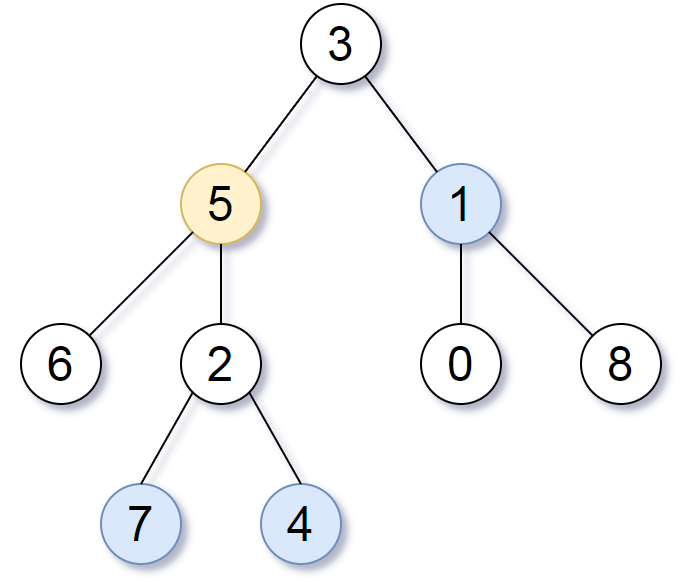We are given a binary tree (with root node root), a target node, and an integer value K.
Return a list of the values of all nodes that have a distance K from the target node. The answer can be returned in any order.
Example 1:
Input: root = [3,5,1,6,2,0,8,null,null,7,4], target = 5, K = 2 Output: [7,4,1] Explanation: The nodes that are a distance 2 from the target node (with value 5) have values 7, 4, and 1.Note that the inputs "root" and "target" are actually TreeNodes. The descriptions of the inputs above are just serializations of these objects.
Note:
- The given tree is non-empty.
- Each node in the tree has unique values
0 <= node.val <= 500. - The
targetnode is a node in the tree. 0 <= K <= 1000.
# Definition for a binary tree node.
# class TreeNode:
# def __init__(self, x):
# self.val = x
# self.left = None
# self.right = None
class Solution:
def distanceK(self, root: TreeNode, target: TreeNode, k: int) -> List[int]:
def parents(root, prev):
nonlocal p
if root is None:
return
p[root] = prev
parents(root.left, root)
parents(root.right, root)
def dfs(root, k):
nonlocal ans, vis
if root is None or root.val in vis:
return
vis.add(root.val)
if k == 0:
ans.append(root.val)
return
dfs(root.left, k - 1)
dfs(root.right, k - 1)
dfs(p[root], k - 1)
p = {}
parents(root, None)
ans = []
vis = set()
dfs(target, k)
return ans/**
* Definition for a binary tree node.
* public class TreeNode {
* int val;
* TreeNode left;
* TreeNode right;
* TreeNode(int x) { val = x; }
* }
*/
class Solution {
private Map<TreeNode, TreeNode> p;
private Set<Integer> vis;
private List<Integer> ans;
public List<Integer> distanceK(TreeNode root, TreeNode target, int k) {
p = new HashMap<>();
vis = new HashSet<>();
ans = new ArrayList<>();
parents(root, null);
dfs(target, k);
return ans;
}
private void parents(TreeNode root, TreeNode prev) {
if (root == null) {
return;
}
p.put(root, prev);
parents(root.left, root);
parents(root.right, root);
}
private void dfs(TreeNode root, int k) {
if (root == null || vis.contains(root.val)) {
return;
}
vis.add(root.val);
if (k == 0) {
ans.add(root.val);
return;
}
dfs(root.left, k - 1);
dfs(root.right, k - 1);
dfs(p.get(root), k - 1);
}
}/**
* Definition for a binary tree node.
* struct TreeNode {
* int val;
* TreeNode *left;
* TreeNode *right;
* TreeNode(int x) : val(x), left(NULL), right(NULL) {}
* };
*/
class Solution {
public:
unordered_map<TreeNode*, TreeNode*> p;
unordered_set<int> vis;
vector<int> ans;
vector<int> distanceK(TreeNode* root, TreeNode* target, int k) {
parents(root, nullptr);
dfs(target, k);
return ans;
}
void parents(TreeNode* root, TreeNode* prev) {
if (!root) return;
p[root] = prev;
parents(root->left, root);
parents(root->right, root);
}
void dfs(TreeNode* root, int k) {
if (!root || vis.count(root->val)) return;
vis.insert(root->val);
if (k == 0)
{
ans.push_back(root->val);
return;
}
dfs(root->left, k - 1);
dfs(root->right, k - 1);
dfs(p[root], k - 1);
}
};/**
* Definition for a binary tree node.
* type TreeNode struct {
* Val int
* Left *TreeNode
* Right *TreeNode
* }
*/
func distanceK(root *TreeNode, target *TreeNode, k int) []int {
p := make(map[*TreeNode]*TreeNode)
vis := make(map[int]bool)
var ans []int
var parents func(root, prev *TreeNode)
parents = func(root, prev *TreeNode) {
if root == nil {
return
}
p[root] = prev
parents(root.Left, root)
parents(root.Right, root)
}
parents(root, nil)
var dfs func(root *TreeNode, k int)
dfs = func(root *TreeNode, k int) {
if root == nil || vis[root.Val] {
return
}
vis[root.Val] = true
if k == 0 {
ans = append(ans, root.Val)
return
}
dfs(root.Left, k-1)
dfs(root.Right, k-1)
dfs(p[root], k-1)
}
dfs(target, k)
return ans
}
